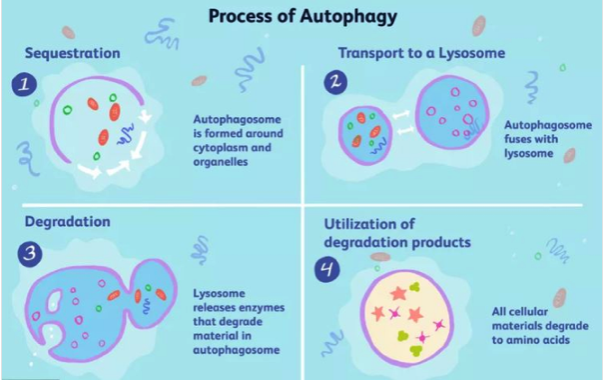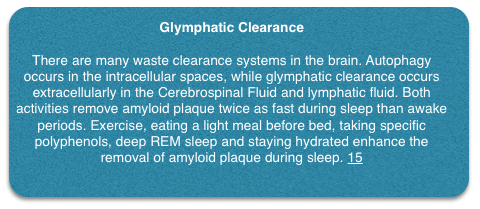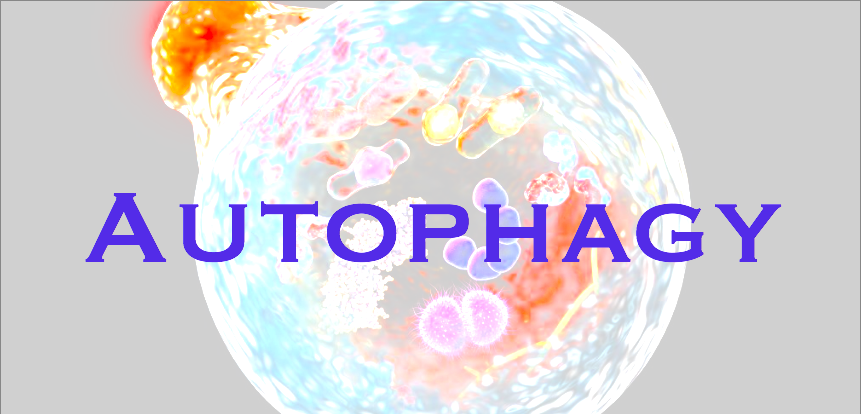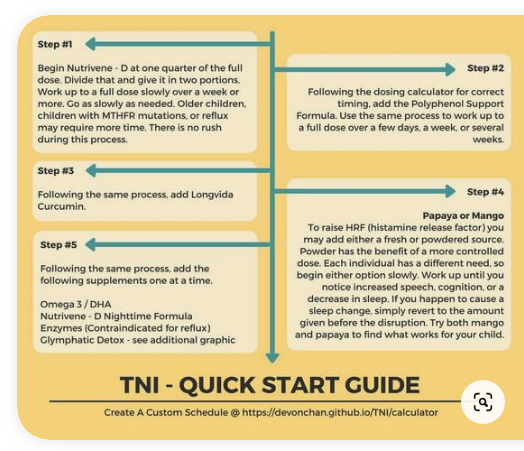By Gabi Giacomin, Dr. of Naturopathic Medicine, Member Trisomy21 Research Foundation, SAC
Original published at http://www.theconsciouspod.com/autophagy-and-down-syndrome/Autophagy in Down Syndrome
The average life expectancy of people with Down Syndrome (DS) has increased to 60 years, due to improved quality of life and social inclusion. Despite these positive advancements, chronic disease incidence remains high, and individuals with DS have the potential to develop early onset Alzheimer’s disease (AD) by the age of 40. Alzheimer’s is the most significant, and second most frequent medical condition after visual impairment in adults with DS. 1
The extra copy of chromosome 21 is a major cause of increased AD risk in DS, mainly due to triplication of the APP gene, which causes a build up of amyloid plaque. One way amyloid plaque is cleaned out of the brain is by a process known as autophagy. 2
Autophagy – self eating
Autophagy is the intracellular process of cleaning out damaged cells, in order to regenerate new cells, “Auto” means self and “phagy” means eat. So the literal meaning of autophagy is “self-eating.” In autophagy, damaged cells are delivered to lysosomes (cellular components) within our cells which digest old cells and recycle the leftover material. 3
4 The Process of Autophagy
Recently, autophagy has been identified as playing an important role in ageing and neurodegeneration. Autophagy is essential for brain plasticity, required for memory and learning and is more efficient in young neurons than in old ones. Defects in autophagy are thought to contribute to neurodegenerative diseases such as AD. 5
Recent research has identified over expression of the APP gene in DS as a cause of poor autophagy, leading to the failure of neuronal waste clearance. This anomalie begins in infancy and evolves to AD symptoms during midlife, making people with DS a model of AD progression in research. 6
Besides the APP gene, what else causes poor autophagy in people with T21?
1. mTOR – Mammalian Target of Rapamycin
mTOR hyperactivation occurs in the DS brain prenatally 10 and suppresses autophagy and mitophagy; a form of selective autophagy activated to clear damaged mitochondria 11. Deficient mitophagy (cleaning mitochondria) in people with DS leads to accumulation of damaged mitochondria and increased oxidative stress. 11 As a result, mTOR inhibition is recommended to restore mitophagy and autophagy in DS.
Numerous studies link alterations in the mTOR pathway in DS with progression to Alzheimer’s disease. 13 Reducing the activity of mTOR in mice brains restores autophagy, resulting in reduced Amyloid plaque and restored memory. 5
2. AMPK – AMP-activated protein kinase
AMPK is an energy sensing protein activated when our energy levels are low. AMPK is one of the main autophagy regulators. 12 Activating AMPK by eating a light meal before bed 13, exercise 14 or polyphenols such as EGCg 15 and Resveratrol 16, inhibits mTOR signalling to stimulate autophagy and promote cellular digestion of amyloid plaque. 12 AMPK also regulates our circadian rhythm 14, and AMPK activity is reduced in DS due to genes on chromosome 21.15
Senescence – “The process of growing old”
Poor autophagy promotes cellular senescence in neurons 7. Cells from Down syndrome individuals have been reported to exhibit many features of early senescence. 8 Senescent cells accumulate in many chronic diseases including Alzheimer’s disease.
According to an article in the Lancet (2020), “ageing occurs in all body tissues and is associated with an increase in cell senescence, a process where damaged cells exit the cell cycle permanently due to stress, and cause inflammation in their senescent state.” In addition, when senescent cells accumulate, chronic diseases like Alzheimer’s, Obesity, Insulin resistance, Cataracts and Chronic Kidney Disease (CKD) proliferate. 9
In a healthy body senescent cells play an important role in wound healing, embryo formation, immunity and tumor suppression. But the steady increase in senescent cells which occurs as we age has adverse effects. 10
How can we stimulate AMPK, suppress mTOR, activate autopagy and reduce cellular senescence in DS to prevent Alzheimer’s disease?
To enhance AMPK activation and autophagy (cellular cleaning), eat a light meal before bed to maximise an overnight fast. Enhancing REM sleep increases autophagy and reduces amyloid plaque build up; melatonin, Valerian, Glycine all part of the TNI protocol, enhance REM sleep 25 26 and exercise activates AMPK. 13
Supplements in the TNI protocol that enhance autophagy:
EGCG, Resveratrol, Curcumin, Luteolin, Apigenin, CoEnzyme Q10, PQQ, Trehalose, Lithium 7 8 9 10 1112 13 14 15
Accelerated ageing and T21
Down Syndrome is synonymous with increased cellular ageing (cell senescence), reduced cellular cleaning (autophagy) and accelerated ageing. Currently, some authors report that T21 is a model of accelerated aging. 1
Current research titled ‘Down Syndrome, accelerated ageing and immunosenescence’ (Journal; Seminars in Immunopathology, 2020) links impaired immunity from birth with aging, or what is now called ‘inflammaging’ – ‘a chronic, low-grade…inflammation associated with several age-related conditions’. 2 Chronic inflammation combined with poor immunity is associated with increased cellular ageing and decreased cleaning (cell senescence, reduced autophagy) and the progression of Alzheimer’s disease in people with DS. 2
So this process which occurs in the typical aging population, starts in people with T21 at birth.
The article concluded that:
“The dysregulation of immune responses and the inflammatory state are likely to greatly contribute to age-related diseases and especially to neurodegeneration which is highly prevalent in this specific population.” 2
What can we do to support all these systems that are causing accelerated ageing in people with T21?
Firstly, we can support the immune system:
Nutrivene Daily Supplement, Curcumin, Luteolin, Apigenin, Beta Glucans, Visbiome 3 5 6
7 8 Avoid antibiotics 9 Avoid thymectomy 10 Find alternatives to Tonsil and adenoid removal 11
Secondly we can support Mitochondria:
EGCg, Resveratrol, Curcumin, CoQ10, PQQ 12 13 14 15 16
Thirdly, we can reduce chronic oxidative stress/ inflammation:
Nutrivene Daily Supplement, EGCg, Resveratrol, Curcumin, Apigenin, Luteolin, Hesperidin, CoQ10 1718 19 20 21 22
Fourthly, we can reduce telomere loss:
Nutrivene Daily supplement, EGCg, Resveratrol, Fish Oil, Healthy Diet, Exercise, Mediation 23
Finally, we can protect stem cells:
Resveratrol, Melatonin, Blueberry, EGCg, Vitamin D, Curcumin 24
Implementing the TNI protocol from birth will reduce inflammation and support the immune system – the main drivers of poor autophagy; Autophagy shapes mitochondrial health and number through mitophagy, significantly controls immune responses, is a potent anti-inflammatory process, plays a critical role in stem cell maintenance and is involved in telomere shortening.
In conclusion, supporting your child’s immune system from birth and reducing inflammation, using the TNI protocol, exercise and good diet has so many benefits not only for their growth and development, but for prevention of chronic disease as they age. Not limited to Alzheimer’s disease, when we support the immune system and reduce inflammation we are targeting the prevention of regression, PANS and PANDAS, autism, ageing, low muscle tone, diabetes and obesity and age related chronic disease.
We can’t see biological activity such as autophagy, mitophagy and cell senscence when we look into our child’s beautiful eyes, but these processes are active from birth, also prenatally, and this is well established in the medical and academic research. So too are the natural compounds which balance their activity, which have been formulated as part of the TNI protocol to support the health and wellbeing of people with Down Syndrome.
If you need support to get your child started on the TNI protocol, if you need assistance understanding this, if you need Naturopathic advice:
Contact the ‘TNI Beginners’ facebook group if you are the parent of a child with DS and would like to understand why supplements are crucial for children with Down Syndrome.
Contact the ‘TNI restoring hope for Down Syndrom Regression’ facebook group if your child is experiencing regression.
Contact The Conscious Pod if you would like a Naturopathic consultation with a Down Syndrome specialist.
Contact our team of Drs specialising in Down Syndrome if you would like a face-to-face appointment in Germany, Portugal or Brazil.
 English
English Español de México
Español de México Português
Português Français
Français




Please I need assistance, my child is now 11 years and has DS, can I start with the supplements now or its late. I’m also residing in South Africa can I get the supplements here.
You can get everything from NuTriVene.com
Open a MeWe.com account and join us on the group Targeted Nutritional Interventiom
International Nutrition and other suppliers will ship to South Africa. Please open an account n MeWe and join the group Targeted Nutritional Intervention for assistance. Or go to NuTriVene.com or email info@nutrivene.com